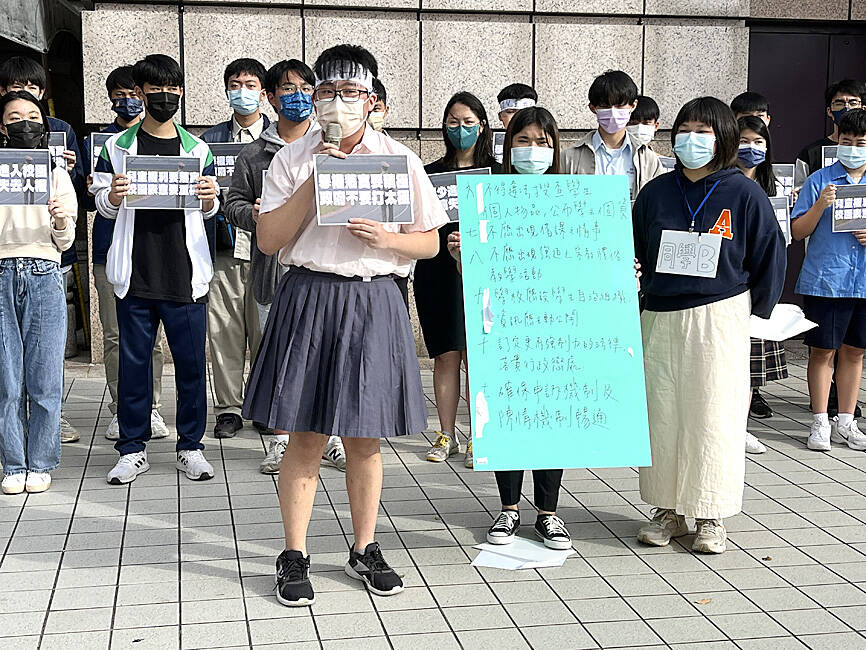High-school students yesterday demonstrated in support of students’ rights outside a meeting to assess Taiwan’s progress in implementing the UN Convention on the Rights of the Child (CRC).
The review of the government’s CRC report, conducted every five years in accordance with the Implementation Act of the Convention on the Rights of the Child (兒童權利公約施行法), was held yesterday in Taipei.
Although not an official signatory to the convention, as it is not a UN member, Taiwan adopted the convention in 2014 and promulgated the act to pledge its commitment to the goals of the accord.

Photo: Chen Chia-yi, Taipei Times
A panel of five experts is meeting at the Taipei International Convention Center until Friday to review progress since the first report, and to review proposed recommendations for the next five years.
Students gathered in front of the center to call attention to “unreasonable” school regulations and norms that infringe on students’ rights.
They cited teachers measuring students’ bangs with a ruler, even though hairstyle rules were repealed 17 years ago.
The Ministry of Education in recent years eased dress regulations and mandatory morning study hall, Taiwan Youth Association for Democracy deputy director Ho Wei-tzu (何蔚慈) said.
However, schools have been slow to change, and many are operating in defiance of ministry rules, he said.
While reporting mechanisms have been updated to allow students to report contraventions, Ho said that the ministry should not wait until it receives a complaint before acting.
Instead, it should be regularly and randomly inspecting schools to ensure compliance, he added.
Authorities should check to make sure student complaints are addressed to make sure they are not left to face the situation alone, he said.
Yesterday’s demonstration was entirely student-initiated and led, Ho said, adding that they would make a presentation to the panel.
Kevin Huang (黃冠凱), head of the student council at the Affiliated Senior High School of National Taiwan Normal University, criticized a tendency among school administrators to ignore student views.
As the representative of a student organization, Huang said he has attended many school meetings at various levels, but it is difficult for students to be heard.
For example, last year the council proposed allowing students to eat lunch off campus, but the idea was rejected in a vote dominated by school administrators, he said.
The right of children to participate in public affairs is protected under the CRC, he said, urging school administrators to listen to students’ views and respect their rights.
The Ministry of Education’s Department of Student Affairs and Special Education Director Wu Lin-hui (吳林輝) accepted a petition from the students, saying he would convey their sentiments to teachers and school administrators.
He said he recognizes their demands, but added that ministry policies are already drafted according to their demands, and following other advanced nations.
Ministry regulations are unevenly adopted by schools, Wu said, urging administrators to update their policies.

A preclearance service to facilitate entry for people traveling to select airports in Japan would be available from Thursday next week to Feb. 25 at Taiwan Taoyuan International Airport, Taoyuan International Airport Corp (TIAC) said on Tuesday. The service was first made available to Taiwanese travelers throughout the winter vacation of 2024 and during the Lunar New Year holiday. In addition to flights to the Japanese cities of Hakodate, Asahikawa, Akita, Sendai, Niigata, Okayama, Takamatsu, Kumamoto and Kagoshima, the service would be available to travelers to Kobe and Oita. The service can be accessed by passengers of 15 flight routes operated by

GIVE AND TAKE: Blood demand continues to rise each year, while fewer young donors are available due to the nation’s falling birthrate, a doctor said Blood donors can redeem points earned from donations to obtain limited edition Formosan black bear travel mugs, the Kaohsiung Blood Center said yesterday, as it announced a goal of stocking 20,000 units of blood prior to the Lunar New Year. The last month of the lunar year is National Blood Donation Month, when local centers seek to stockpile blood for use during the Lunar New Year holiday. The blood demand in southern Taiwan — including Tainan and Kaohsiung, as well as Chiayi, Pingtung, Penghu and Taitung counties — is about 2,000 units per day, the center said. The donation campaign aims to boost

ENHANCING EFFICIENCY: The apron can accommodate 16 airplanes overnight at Taoyuan airport while work on the third runway continues, the transport minister said A new temporary overnight parking apron at Taiwan Taoyuan International Airport is to start operating on Friday next week to boost operational efficiency while the third runway is being constructed, the Ministry of Transportation and Communications said yesterday. The apron — one of the crucial projects in the construction of the third runway — can accommodate 16 aircraft overnight at the nation’s largest international airport, Minister of Transportation and Communications Chen Shih-kai (陳世凱) told reporters while inspecting the new facility yesterday morning. Aside from providing the airport operator with greater flexibility in aircraft parking during the third runway construction,

American climber Alex Honnold is to attempt a free climb of Taipei 101 today at 9am, with traffic closures around the skyscraper. To accommodate the climb attempt and filming, the Taipei Department of Transportation said traffic controls would be enforced around the Taipei 101 area. If weather conditions delay the climb, the restrictions would be pushed back to tomorrow. Traffic controls would be in place today from 7am to 11am around the Taipei 101 area, the department said. Songzhi Road would be fully closed in both directions between Songlian Road and Xinyi Road Sec 5, it said, adding that bidirectional traffic controls would